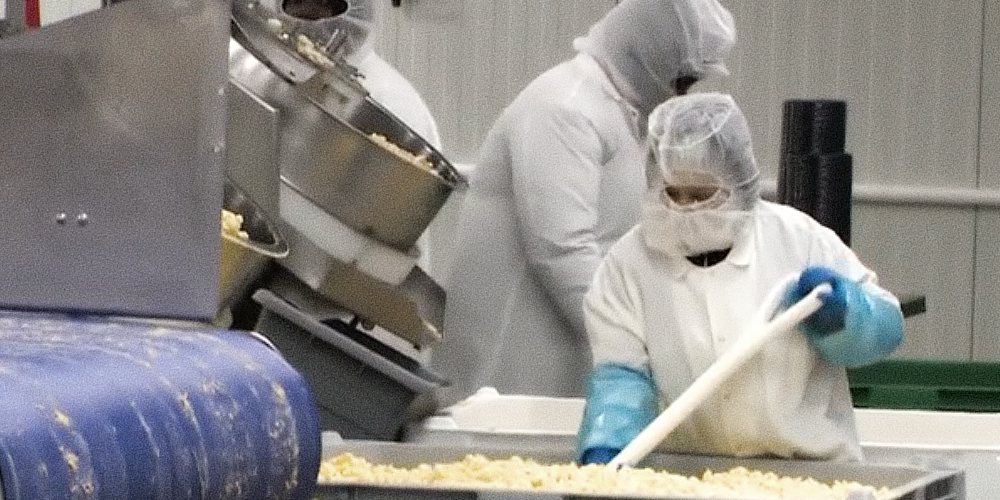(Zero Hedge)—A mysterious staffing firm operating a complex van transportation network supplying low-cost Haitian labor to a Charleroi, PA-based company that operates multiple food packing plants in the area has been at the center of a federal investigation.
On Friday, local media outlet Action News revealed that federal investigators had been investigating staffing firm Prosperity Services, which supplies cheap migrant labor to Fourth Street Foods in Charleroi.
According to Action News, Fourth Street “employs 700 immigrants from 41 countries, many of them Haitians.” The migrants work on conveyor lines in massive ice boxes to slap breakfast bowls and sandwiches together under various private-label brands for big box retailers.
Here’s the bombshell from the media outlet published Friday evening:
Many of Fourth Street’s workers are actually employed by a contractor, Prosperity Services. Prosperity also transports workers in vans, which can be seen throughout Charleroi.
In court records, federal investigators said Prosperity “knowingly paid undocumented non-citizen employees with cash” and “transported and housed undocumented non-citizens for employment purposes.”
Earlier this year, the feds seized nearly $1 million in cash from Prosperity and two men affiliated with the company, including Andy Ha, the company president.
Incredible footage revealing an operation in Charleroi, PA where Haitians are being bussed to and from food factories operated by Fourth Street Foods.
It’s estimated that 90% of workers are now made up of Haitians.
Kamala imported 2,000 Haitians into this town of 4,000 people… pic.twitter.com/6KrjecNdmh
— Libs of TikTok (@libsoftiktok) September 17, 2024
In a separate report, journalist Christopher Rufo found out…
At the center of this system in Charleroi is Fourth Street Foods, a frozen-food supplier with approximately 1,000 employees, most of whom work on the assembly line. In an exclusive interview, Chris Scott, the CEO and COO of Fourth Street Barbeque (the legal name of the firm that does business as Fourth Street Foods) explained that his company, like many factory businesses, has long relied on immigrant labor, which, he estimates, makes up about 70 percent of its workforce. The firm employs many temporary workers, and, with the arrival of the Haitians, has found a new group of laborers willing to work long days in an industrial freezer, starting at about $12 an hour.
Many of these workers are not directly employed by Fourth Street Foods. Instead, according to Scott, they are hired through staffing agencies, which pay workers about $12 an hour for entry-level food-processing roles and bill Fourth Street Foods over $16 per hour to cover their costs, including transportation and overhead. (The average wage for an entry-level food processor in Washington County was $16.42 per hour in 2023.)
Rufo uncovered other staffing companies …
According to a Haitian migrant who worked at Fourth Street and a review of video footage, three staffing agencies—Wellington Staffing Agency, Celebes Staffing Services, and Advantage Staffing Agency—are key conduits for labor in the city. None have websites, advertise their services, or appear in job listings. According to Scott, Fourth Street Foods relies on agencies to staff its contract workforce, but he declined to specify which agencies, citing nondisclosure agreements.
He continued:
A property search for David Barbe and his other business, DB Rentals LLC, shows records of more than 50 properties, many of which are concentrated on the same streets.
And continued some more:
No doubt, the situation is advantageous to David Barbe of Fourth Street Foods, who can pay $16 an hour to the agencies that employ his contract labor force, then recapture some of those wages in rent…
Fourth Street Foods owner David Barbe told the media outlet: “I don’t know anything about it.”
Considering the town has been swamped by Haitians … solely for the purpose of supplying Fourth Street Foods with cheap labor, the owner’s statement to the media outlet seems a little suspicious.
The travesty in Charleroi begins with the failure of the federal government’s open borders, flooding the nation with ten-plus million migrants. This has led to a ‘great job replacement’ of native-born factory workers.
How is this not the biggest political talking point right now: since October 2019, native-born US workers have lost 1.4 million jobs; over the same period foreign-born workers have gained 3 million jobs. pic.twitter.com/Z5HVWmQ24C
— zerohedge (@zerohedge) January 15, 2024
Rufo noted:
The basic pattern in Charleroi has been replicated in thousands of cities and towns across America: the federal government has opened the borders to all comers; a web of publicly funded NGOs has facilitated the flow of migrants within the country; local industries have welcomed the arrival of cheap, pliant labor.
This is spreading…
First Springfield, Then Charleroi, Now Migrant Crisis Swamps This Small Indiana Town https://t.co/g1ev2yZwi7
— zerohedge (@zerohedge) October 10, 2024
"Blow Your Mind": Ex-WSJ Journo Uncovers Hub Of An Alleged Migrant Trafficking Network In Springfield, Ohio https://t.co/Wz1hOGy3XD
— zerohedge (@zerohedge) September 18, 2024
Union Makes Shock Claim: Colorado Meat Factory Involved In "Mgmt-Led Human Trafficking" Of Haitians https://t.co/fusclWbmax
— zerohedge (@zerohedge) September 25, 2024
This is nationwide.
US Map Shows Potential Areas Of Migrant 'Great Job Replacement' https://t.co/L0IfntWwmK
— zerohedge (@zerohedge) September 19, 2024
This is not America First – this is globalist open border corporate profits first, at the expense of the native-born blue-collar worker.
What Would You Do If Pharmacies Couldn’t Provide You With Crucial Medications or Antibiotics?
The medication supply chain from China and India is more fragile than ever since Covid. The US is not equipped to handle our pharmaceutical needs. We’ve already seen shortages with antibiotics and other medications in recent months and pharmaceutical challenges are becoming more frequent today.
Our partners at Jase Medical offer a simple solution for Americans to be prepared in case things go south. Their “Jase Case” gives Americans emergency antibiotics they can store away while their “Jase Daily” offers a wide array of prescription drugs to treat the ailments most common to Americans.
They do this through a process that embraces medical freedom. Their secure online form allows board-certified physicians to prescribe the needed drugs. They are then delivered directly to the customer from their pharmacy network. The physicians are available to answer treatment related questions.


